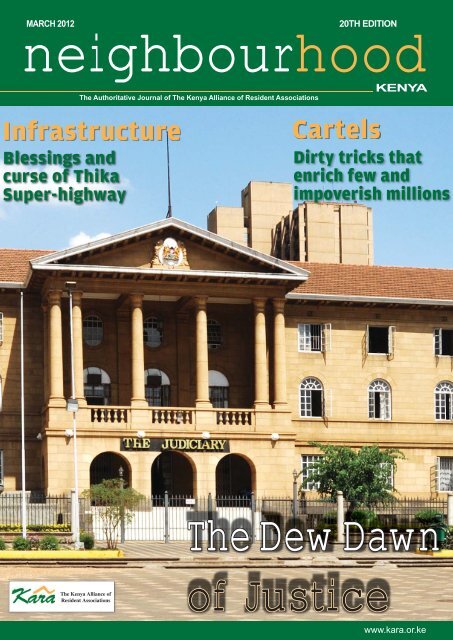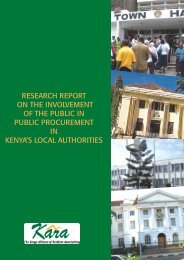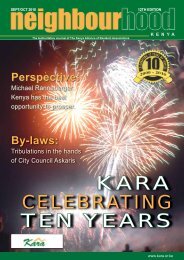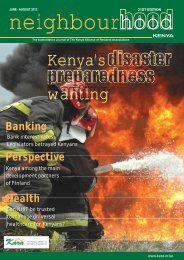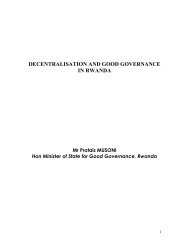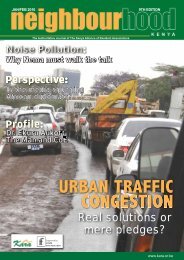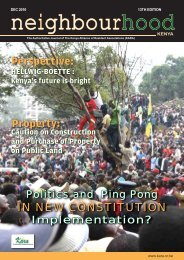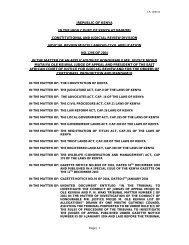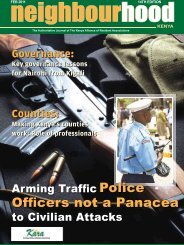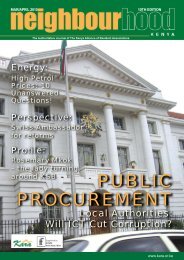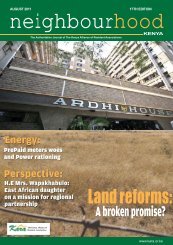Neighbourhood Kenya 20th Edition - Kara
Neighbourhood Kenya 20th Edition - Kara
Neighbourhood Kenya 20th Edition - Kara
Create successful ePaper yourself
Turn your PDF publications into a flip-book with our unique Google optimized e-Paper software.
MARCH 2012<br />
20TH EDITION<br />
neighbourhood<br />
KENYA<br />
The Authoritative Journal of The <strong>Kenya</strong> Alliance of Resident Associations<br />
Infrastructure<br />
Blessings and<br />
curse of Thika<br />
Super-highway<br />
Cartels<br />
Dirty tricks that<br />
enrich few and<br />
impoverish millions<br />
The Dew Dawn<br />
The <strong>Kenya</strong> Alliance of<br />
Resident Associations<br />
of Justice<br />
www.kara.or.ke
COVER STORY<br />
Editor’s<br />
Note<br />
Welcome to the <strong>20th</strong> edition of your<br />
preferred public service delivery<br />
focused journal. We appreciate<br />
your support and encouraging<br />
feedback.<br />
2012 has begun on a very dramatic note for<br />
<strong>Kenya</strong>ns as the real impact of the Constitution<br />
begins to manifest itself. <strong>Kenya</strong>ns are more assertive<br />
and are demanding strict fidelity to the Constitution.<br />
As a result, senior Government offi cers such<br />
as the Deputy Chief Justice Ms. Nancy Baraza,<br />
the Deputy Prime Minister and former Head of<br />
Public Service Mr. Francis Muthaura who found<br />
themselves on wrong side of the law have been<br />
compelled to relinquish their respective positions.<br />
The demonstrated citizens’ vigilance and demand for<br />
the respect of the rule of law must be sustained to<br />
realize the full impact of the Constitution.<br />
In this edition of our journal, we focus on security<br />
issues and bring you arguments for and against<br />
having a civilian Inspector General to head the<br />
<strong>Kenya</strong> Police Service and the impact on the much<br />
anticipated police reforms.<br />
Also read about diverse views on the proposed<br />
phasing out of the 14 seater matatus. Will such a<br />
move solve traffic congestion on our roads or there<br />
is need for a more integrated transport system<br />
The construction of the Thika-Superhighway is<br />
near completion. But what exactly will be the impact<br />
of the superhighway on <strong>Kenya</strong>’s economy and the<br />
regular users We bring you experts’ views on the<br />
various aspects of the superhighway and its impacts.<br />
We also bring you experts’ views on whether<br />
<strong>Kenya</strong>ns have begun experiencing the full impact<br />
of the Constitution of <strong>Kenya</strong> and how the ordinary<br />
citizens are benefiting. What lessons can be drawn<br />
from the recent predicament of the suspended<br />
Deputy Chief Justice and how can that be attributed<br />
to the Constitution<br />
On the <strong>Kara</strong> front, we continue with the<br />
sensitisation of the public on key principles of<br />
devolution and roles and responsibilities of the<br />
citizens in achieving a responsive devolution<br />
process.<br />
Among other activities, we have held<br />
sensitisation forums in 10 Counties and still have six<br />
more lined up. The second Annual Media Excellence<br />
Awards will be hosted at the end of the year and we<br />
will soon request you to nominate candidates for the<br />
awards.<br />
We look forward to a rewarding 2012 with<br />
enhanced access to public service delivery. As<br />
always, we are counting on your support and active<br />
participation in our programs. Thank you!<br />
The new dawn<br />
of Justice<br />
When Chief Justice Willy<br />
Mutunga assumed<br />
offi ce in June last year,<br />
he made a vow to<br />
indiscriminately root out corruption and<br />
impunity in the country. Mutunga, who is<br />
also the president of the Supreme Court,<br />
emphasised that his mission was diffi cult yet<br />
achievable.<br />
In a country where the high and mighty<br />
have always had their way, analysts swiftly<br />
warned that to transform a judiciary widely<br />
seen as ineffi cient and corrupt, we should<br />
stand up to the political elite, powerful<br />
businessmen and other groups deemed<br />
untouchable in the past.<br />
While Mutunga has been commended<br />
for making a positive and bold start that<br />
has seen him strongly stand by judges who<br />
have made rulings that have rubbed even<br />
the political elite the wrong way, one of<br />
his trickiest tests yet came when his own<br />
deputy strayed into murky waters.<br />
On New Year’s Eve, Deputy Chief<br />
Justice (DCJ) Nancy Baraza made<br />
unexpected headlines after Rebecca<br />
Kerubo, a guard at the Village Market<br />
shopping mall, claimed she threatened her<br />
with a gun. The claims elicited widespread<br />
uproar with the public calling for Baraza’s<br />
resignation and subsequent prosecution.<br />
Sensing the negative image that the<br />
newly-constituted judiciary was gaining<br />
due to the incident, Mutunga immediately<br />
summoned an emergency session of the<br />
Judicial Service Commission (JSC) to<br />
discuss the shopping mall incident. The<br />
JSC is the body that employs judges,<br />
magistrates and other judicial offi cers and<br />
can equally discipline judiciary offi cials or<br />
recommend to the President that a tribunal<br />
be formed to remove a judge from offi ce.<br />
A sub-committee formed to probe<br />
the incident recommended that the JSC<br />
petitions the president to have Baraza<br />
removed from offi ce, just eight months<br />
after she endured gruelling and at times<br />
extremely embarrassing public interviews<br />
to secure the job. And that was not all as<br />
the police have recommended that the DCJ<br />
faces criminal prosecution.<br />
With Kerubo expected to have been<br />
the outright loser in such a duel in the past,<br />
the bold and decisive action proposed<br />
3.
COVER STORY<br />
From Page 3<br />
New justice...<br />
against Baraza has not only drawn mixed<br />
reactions but also raised critical questions.<br />
Could it be a sign of the end of impunity<br />
in <strong>Kenya</strong> Has the new constitution fi nally<br />
guaranteed Wanjiku the rights she has<br />
always been denied<br />
Kerubo, says she is relieved that the<br />
ordinary citizen now seems to have a say<br />
when it comes to duels pitting the high<br />
and mighty against lowly.<br />
“Mnyonge hakuwa na haki hapo<br />
mbeleni lakini mambo yamebadilika na<br />
sasa ako na haki (the poor did not have<br />
rights in the past but the situation has<br />
changed and now they do),” she notes.<br />
According to Maina Kiai, a UN Special<br />
Rapporteur on the rights to freedom of<br />
peaceful assembly, JSC’s decisiveness on<br />
the matter might be an ideal opening for<br />
the judiciary to garner public confi dence.<br />
Acknowledging that the old days of<br />
impunity are disappearing, Kiai says by<br />
not demeaning the issue, the judiciary has<br />
set a convincing precedent on how public<br />
"Mnyonge hakuwa na haki<br />
hapo mbeleni lakini mambo<br />
yamebadilika na sasa ako na haki<br />
(the poor did not have rights in<br />
the past but the situation has<br />
changed and now they do),"<br />
servants should behave.<br />
The human rights activist lauds the<br />
way Kerubo stood her ground against the<br />
deputy chief justice, noting that if handled<br />
aptly, this could be the defi ning moment in<br />
the transformation <strong>Kenya</strong>ns crave.<br />
“As <strong>Kenya</strong>ns enjoy the new<br />
Constitution and the changes that it<br />
promises, more ordinary people will stand<br />
up to be counted and for themselves,<br />
certain of a fair hearing,” Kiai notes. He<br />
says it is only when ordinary people do<br />
extraordinary things that change comes.<br />
Former Kibwezi MP Kalembe Ndile,<br />
who has been a consistentl vocal<br />
advocate for the voiceless, says the fact<br />
that severe action was taken against<br />
Baraza is a positive sign that the new<br />
constitution is ensuring that the ordinary<br />
citizens are also heard.<br />
But he opines that the JSC verdict<br />
could have been politically motivated and<br />
expresses hope that the justice accorded<br />
to Kerubo will not be a one-off affair.<br />
Peter Gichira, a human rights activist,<br />
notes that the JSC’s bold verdict will give<br />
everyone a chance to obey the law as it<br />
will be clear that the law is about justice as<br />
opposed to position in society.<br />
“The ruling marked the day when men,<br />
women, children and the old were given<br />
reason to entrust their lives, property and<br />
destiny in the law and a judicial system<br />
headed by men and women of honour,<br />
who truly believe that justice is indeed, our<br />
shield and defender,” he states.<br />
But Bishop William Abuka of the Faith<br />
Community Fellowship in Nairobi differs.<br />
He says Baraza’s case does not represent<br />
justice for the lowly and that the DCJ is<br />
a victim of public lynching. He notes that<br />
action against Baraza is discriminative<br />
rather than constitutional no such action<br />
has been taken against other public<br />
offi cers accussed of arrogance.<br />
“We appreciate the new constitution<br />
and that it gives everyone a chance to<br />
enjoy liberty. But as much as Baraza<br />
was wrong and treated someone with<br />
arrogance, the fact of the matter is that<br />
she has been used as a sacrifi cial lamb by<br />
individuals who have vested interests,” the<br />
bishop asserts.<br />
Disclaimer:<br />
<strong>Neighbourhood</strong> <strong>Kenya</strong> is produced bi-monthly by The <strong>Kenya</strong> Alliance of Resident Associations (KARA) The opinion expressed in the articles are those of the authors and<br />
do not necessarily reflect KARA’s offi cial position. The editor welcomes contributions of articles and photographs from members of the public. Any materials received will<br />
be treated as unconditionally assigned for public and will be subject to KARA’s unrestricted right to edit and publish.KARA reserves the right of this publication and no<br />
part can be published in anyway without express permission.
OUR PEOPLE<br />
OUR PEOPLE<br />
VALLEY VIEW RESIDENTS<br />
ASSOCIATION (VVRA)<br />
Valley View Estate, which comprises 418<br />
housing and 7 trading units, is located about 30<br />
Kms from Nairobi along Mombasa Road, just<br />
after Mlolongo Trading Centre at the valley overlooking the<br />
Kenchic Hatchery – thus the name of the association. The<br />
houses were developed by Harp Developers with the first<br />
habitants streaming in early 2006.<br />
The challenges faced by the residents then, which<br />
included lack of an access road to the estate from<br />
Mombasa Road, poor garbage and waste management in<br />
the estate and security concerns, were among the needs<br />
that caused the formation of the Association in 2008 and<br />
consequent registration as a Society in April 2008 and<br />
further joining KARA in 2010.<br />
To manage its needs, the Association is served by 16<br />
staff headed by an Estate Manager. Other than general<br />
maintenance, security and cleanliness of the estate, the<br />
estate manager coordinates the daily matters relating to<br />
the welfare and needs of the residents in consultation with<br />
the estate’s Executive Committee (ExCo). The Association<br />
has had fruitful engagements with the developer and<br />
government agencies including Mavoko County Council,<br />
MAVWASCO, NEMA, KeNHA through the ExCo, at<br />
times in conjunction with KARA to ensure the welfare of<br />
the residents is met.<br />
Residents contribute a monthly service charge that<br />
covers staff and common area costs including security<br />
lights, water and garbage collection. Maintenance costs<br />
and improvements are met from these funds.<br />
To build good neighbourliness, the association has<br />
enhanced lane meetings that culminated in successful<br />
lane end of year parties that give residents opportunities<br />
to closely interact and forge unities. There is also a<br />
jogging group that also builds contacts among residents<br />
as they keep fit. For communication purposes, VVRA<br />
maintains a Google Group email address where<br />
residents are listed after execution of requisite form.<br />
Notices and general communications are posted through<br />
this media.<br />
Nutritious Meals in Minutes: Recipe One<br />
‘The Perfect Hot Dog’<br />
Ingredients: Farmer’s Choice Frankfurters or Viennas<br />
Method: Heat, Seat, Eat.<br />
Serves 4<br />
Farmer’s Choice - Keep it Simple!<br />
Pork Frankfurters, Beef Viennas and Poultry Viennas are available from your favourite supermarket. Kids love ‘em!<br />
www.farmerschoice.co.ke
PERSPECTIVE<br />
Italian Ambassador:<br />
The future is bright<br />
for <strong>Kenya</strong>/Italy<br />
diplomatic relations<br />
In life it is not always that we live our<br />
dreams as circumstances at times<br />
force us to pursue interests that are<br />
different from our initial aspirations.<br />
However, Her Excellency Paola Imperiale,<br />
the Italian Ambassador to <strong>Kenya</strong> and<br />
Seychelles, is living her dreams as her<br />
childhood ambition was to be a diplomat. It<br />
is clear from interacting with her that she is<br />
passionate about diplomatic issues and has<br />
spent most ofher life serving her country in<br />
various capacities in the diplomatic circles.<br />
A graduate of Political Science and Law<br />
from University of Rome, she started her<br />
career in 1975 and has risen through the<br />
H.E. Paola Imperiale,<br />
the Italian Ambassador<br />
to <strong>Kenya</strong> and Seychelles.<br />
At present, the<br />
Italian Government<br />
is funding 19 projects<br />
in <strong>Kenya</strong> worth<br />
Kshs.60 billion in<br />
priority areas of<br />
water, health, urban<br />
development and<br />
emergencies<br />
ranks to her current position. She also<br />
undertook professional training at the Italian<br />
Diplomatic Institute in the early part of her<br />
career.<br />
While she has spent her career life in<br />
diplomatic circles, it is the fi rst time she is<br />
representing her country as an Ambassador.<br />
She has been in <strong>Kenya</strong> since March 2011<br />
and is proud of the cordial relations between<br />
the two countries.<br />
“At present, the Italian Government is<br />
funding 19 projects in <strong>Kenya</strong> worth Kshs.60<br />
billion in priority areas of water, health,<br />
urban development and emergencies,” she<br />
explains. Through the <strong>Kenya</strong> Italy Debt for<br />
6.
PERSPECTIVE<br />
Development Programme (KIDDP), the<br />
Italian Government has been supporting<br />
<strong>Kenya</strong> to reduce its external debt burden<br />
while at the same time sustaining its efforts<br />
towards achieving the development targets<br />
set by the national policies and Millennium<br />
Development Goals. On Humanitarian<br />
assistance, an initiative worth Kshs.120<br />
million has been approved to support<br />
332,000 Somali refugees in Dadaab camps<br />
.<br />
Apart from development initiatives, the<br />
Ambassador is also keen to enhance the<br />
diplomatic relations between <strong>Kenya</strong> and<br />
Italy through promotion of cultural practices.<br />
In this regard, she invited a renowned Italian<br />
Orchestra to perform in <strong>Kenya</strong> last year<br />
and hopes that such initiatives will provide<br />
platforms for <strong>Kenya</strong>ns and Italians to learn<br />
from each other in terms of their cultural<br />
practices.<br />
Despite the good relations between the<br />
two countries, she says there is still much to<br />
be done regarding the bi-lateral economic<br />
ties and she is determined to enhance the<br />
ties during her tour of duty.<br />
The envoy says that one strong attribute<br />
that <strong>Kenya</strong> has is the vibrant media. “The<br />
media in <strong>Kenya</strong>, just like in other countries,<br />
plays a signifi cant role in keeping the public<br />
informed on various political and socioeconomic<br />
issues and this is very important<br />
for the growth of the country,” she explains.<br />
She sees the implementation of the<br />
Constitution of <strong>Kenya</strong> as the main priority<br />
for <strong>Kenya</strong>ns and reaffi rms her country’s<br />
commitment to ensure the process is on<br />
track. Regarding the ongoing situation in<br />
Somalia, the Ambassador calls for patience<br />
to allow the international organs such as the<br />
United Nations Security Council to make<br />
an informed decision that will lead to a long<br />
lasting solution.<br />
Her position on the ongoing International<br />
Criminal Court (ICC) process in regards to<br />
the 2007 post election violence is that the<br />
ICC should be allowed to fulfi ll its mandate<br />
under the Rome Statute and ensure justice<br />
is delivered.<br />
Ms. Imperiale’s typical day is spent<br />
reading historical books of ancient and<br />
medieval ages. She also likes gardening<br />
and walking as a way of exercising. She has<br />
no specifi c mentor: “I draw inspiration from<br />
fellow colleagues who have helped shape<br />
my diplomatic career and I can say that they<br />
are my mentors,” she says.<br />
What constitutes happiness for her “I<br />
think that happiness is a very big word<br />
with a lot of meaning. It is diffi cult to reach<br />
happiness during your own human life.<br />
Happiness includes constant efforts to try and<br />
avoid bad things and get the good aspects<br />
of a situation. Happiness must transcend<br />
material possession, it must be an effort<br />
to change one’s personality especially the<br />
negatives bits and to accept the others for<br />
who they are,” she explains.<br />
She has a son who is currently a student<br />
at a university in Italy. She has a younger<br />
brother whom she has a lot of affection<br />
for and is a lawyer back in Italy. When she<br />
fi nally calls it a day in her diplomatic career,<br />
she hopes to put to use her legal training<br />
and start practising law.<br />
7.
security<br />
Police Reforms:<br />
Is a civilian service<br />
head the answer<br />
Is <strong>Kenya</strong> ready for a civilian police<br />
boss This is one question that has<br />
triggered fi erce debate in the country<br />
amid attempts to have the police<br />
service conform to the new constitutional<br />
order.<br />
The nation is currently awaiting the<br />
appointment of members of the National<br />
Police Service Commission (NPSC), who will<br />
subsequently be responsible for the hiring of<br />
the country’s fi rst Inspector General of Police.<br />
But the fact that the constitution<br />
indiscriminately allows any qualifi ed <strong>Kenya</strong>n<br />
to apply for the position has generated<br />
controversy. While this might pave way for a<br />
civilian to take over the topmost management<br />
of the police service, senior offi cers of the<br />
<strong>Kenya</strong> Police have openly opposed any such<br />
move.<br />
The offi cers are adamant that the Police<br />
should be led by a trained professional, with a<br />
section of <strong>Kenya</strong>ns also terming this a ploy by<br />
non-governmental organizations to have one<br />
of them as the police boss. But the issue has<br />
attracted as much support as opposition, with<br />
some opining that having a civilian police boss<br />
will be the best way to cleanse a force that has<br />
for decades been dogged by a poor image.<br />
Among those who have outrightly opposed<br />
the move are Police Spokesman Eric Kiraithe<br />
and his deputy Charles Owino, as well as<br />
Criminal Investigations Department CID<br />
Director Ndegwa Muhoro.<br />
It is Owino who fi red the fi rst salvo when<br />
he stated that Vigilance House, the police<br />
headquarters, is not be a training ground for<br />
civilians who want to be police officers and get<br />
leadership posts. “We have competent offi cers<br />
who can be inspector general,” he noted.<br />
The CID chief has also made it clear<br />
that <strong>Kenya</strong> is not ready for a civilian police<br />
boss.<br />
“Police is not G4S, Group 4, Securex or<br />
Wells Fargo that needs a managing director<br />
to run it well. This is a professional institution<br />
that needs a professional to guide it and we<br />
have qualified offi cers to be appointed to that<br />
position,” he exclaimed.<br />
The comments have drawn mixed<br />
reactions from the government and private<br />
sector, with some even accusing Owino of<br />
threatening mutiny in the police force while<br />
enjoying the blessings of his seniors.<br />
But Owino has since made his position<br />
clear. He says the constitution calls for a<br />
professional to be the inspector general of<br />
police and notes that in his opinion; only<br />
a trained police offi cer can be deemed a<br />
professional in police matters.<br />
“Let’s not have formed opinions that we<br />
do not have qualifi ed policemen. What I said<br />
is that we do not need a civilian police boss<br />
now since you cannot separate operation and<br />
management within the police force,” he notes.<br />
And being an election year, Owino notes<br />
that the country should not gamble with<br />
security by hiring a civilian, a move he says<br />
would inevitably draw some form of resistance.<br />
But he is quick to note that the force would not<br />
mind having an experienced foreigner as the<br />
boss in the meantime in a bid to facilitate a<br />
smooth transition.<br />
8.
security<br />
“Let the best brains come forward but the<br />
fact is that we will beat civilians hands down<br />
during interviews,” he affi rms.<br />
Police spokesman Kiraithe echoes Owino’s<br />
views.<br />
“The inspector general of police is, as<br />
established under the constitution, supposed<br />
to take command. He is neither a politician nor<br />
a supervisor, but a commander. Those talking<br />
about a civilian police boss are missing the<br />
point,” he says.<br />
Kiraithe says the police force ought to be<br />
led by a qualifi ed police offi cer but assures that<br />
if a civilian gets the nod, he will be welcomed<br />
and supported.<br />
But there are those who believe the police<br />
force should be marshaled by a civilian if the<br />
perceived culture of impunity within the force is<br />
to be checked.<br />
Muslim for Human Rights (Muhuri)<br />
Executive Director Khalid Hussien says the<br />
police force should be led by a civilian as the<br />
inspector general if it is serious about reforms.<br />
He states that only a civilian will inject fresh<br />
blood into a police service that he notes is<br />
characterized by deep impunity and a culture<br />
of mistrust.<br />
“The judiciary has already set precedence<br />
by hiring Dr. Willy Mutunga from the NGO and<br />
he has brought significant reforms within a<br />
very short time. The police should not be an<br />
exceptionand should hire a qualifi ed outsider<br />
who stands for change,” Khalid states.<br />
He disputes claims by senior police<br />
offi cers that only trained policemen can<br />
qualify as security professionals and notes<br />
that the private sector has well-educated and<br />
experienced security experts who can deliver.<br />
But there are those who believe the<br />
position should be handed to any qualified<br />
<strong>Kenya</strong>n, provided he delivers quality service.<br />
“It matters less where the inspector general<br />
will come from, be it a civilian or a police offi cer<br />
provided he is qualified and meets the set<br />
standards,” states Capt [Rtd] Simiyu Werunga,<br />
a security expert.<br />
He urges police officers opposing a civilian<br />
as the inspector general to hold their guns<br />
and welcome any outcome as they are not the<br />
ones who advocated for reforms in the police<br />
force.<br />
Werunga’s sentiments are echoed by<br />
former <strong>Kenya</strong> National Commission on Human<br />
Rights (KNCHR) commissioner Omar Hassan,<br />
who affi rms that the constitution allows any<br />
qualifi ed <strong>Kenya</strong>n to apply for the police top job.<br />
Former Internal Security Permanent<br />
Secretary Francis Kimemia has also been<br />
quick to call for calm among police offi cers<br />
opposing the hiring of a civilian, saying the<br />
constitution should not be opposed.<br />
Kimemia, who is noe head of civil service,<br />
wonders why police are reluctant to accept a<br />
civilian as their boss yet the military has never<br />
had such protests despite being led by the<br />
president, who is a civilian.<br />
Before the current Police Commissioner<br />
Mathew Iteere assumed offi ce, the police force<br />
was under Major Gen. Hussein Ali, a military<br />
man who albeit taking time to settle in his job,<br />
was deemed effective.<br />
9.
FOCUS<br />
As 2012 maneuvers the teething<br />
stage, the fact that the year<br />
will be a defi ning period in the<br />
country’s history seems not lost on<br />
<strong>Kenya</strong>ns.<br />
And it will not only be momentous due to a<br />
probable general election and subsequent transition<br />
from one presidency to another. It is also the year<br />
when the country will face major institutional,<br />
governance and administrative changes that could<br />
highly transform service delivery. This is not to<br />
mention several appointments anticipated in various<br />
government authorities, and which could eat into,<br />
stagnate or build on recent gains.<br />
The most crucial, and perhaps the most<br />
sensitive event in 2012, would be the General<br />
Elections. If the two principals concur that the<br />
elections be held at the end of this year, the<br />
expected political duel would be signifi cant in<br />
various ways.<br />
First, they will be the first polls since the<br />
disputed 2007 elections that triggered widespread<br />
ethnic violence and hatred, the worst in the country<br />
since independence. Secondly; they will be the fi rst<br />
presidential polls under the new constitution and<br />
unarguably the most sophisticated ever.<br />
While the polls will pose a key test to the<br />
citizenry and the leadership alike, the main test<br />
will fall in the hands of the Issack Hassan-led<br />
independent Electoral and Boundaries Commission<br />
(IEBC). With the 2007 polls having almost plunged<br />
the country into civil war, it will be IEBC’s duty to<br />
restore public confidence in the electoral process<br />
and avert any tension by ensuring the polls are<br />
conducted and managed in a free and fair manner.<br />
Prior to conducting the<br />
elections, IEBC will also have<br />
to overcome the tricky task of<br />
setting up new constituencies<br />
followed by countrywide voter<br />
registration.<br />
The impending polls will also<br />
not just mark the election of a new head of<br />
state but equally the exit of President Mwai<br />
Kibaki, who is serving the last full year of his<br />
constitutionally allowed two terms as President.<br />
The Kibaki presidency has been characterized<br />
by phenomenal infrastructure development and<br />
at one point saw the economy grow by seven<br />
percent per annum. But it has also had its<br />
The most crucial,<br />
and perhaps the<br />
most sensitive<br />
event in 2012,<br />
would be the<br />
General Election.<br />
downside,<br />
having been rocked by several<br />
mega corruption scandals and a<br />
record fall of the shilling against major<br />
currencies, not to mention unprecedented<br />
infl ation levels. As President Kibaki exits State<br />
House, it will thus be interesting to see who <strong>Kenya</strong>ns<br />
will vote in as head of state, and the leadership<br />
approach he/she will assume. The International<br />
Criminal Court (ICC) has also given the upcoming<br />
polls a new twist after it confi rmed charges facing two<br />
of the leading presidential aspirants William Ruto and<br />
Uhuru <strong>Kenya</strong>tta. The nation will be keenly watching<br />
to see if the two are given the green light to vie for<br />
the top seat, and how they juggle their campaigns<br />
with a highly demanding legal process.<br />
The year 2012 is equally expected to be a<br />
phenomenal year for the judiciary, a crucial arm<br />
of government as far as governance and service<br />
delivery are concerned.<br />
Among the key events on this front will be the<br />
ongoing vetting of all judges and magistrates who<br />
were still serving when the new constitution was<br />
promulgated in August 2010. The vetting kicked off<br />
with the 10 Court of Appeal judges followed by High<br />
court judges and then magistrates.<br />
With a signifi cant percentage of the serving<br />
judges having at one point made rulings that were<br />
highly unpopular in the public eye, the vetting is<br />
expected to be a chilling affair in which the judges<br />
will have to justify their decisions.<br />
In another key turning point, Court of Appeal<br />
Judges will also from this year be posted<br />
permanently in stations across the country. This<br />
10.
FOCUS<br />
will be a major boost to service delivery in the<br />
judiciary given that under the current system, the<br />
judges visit several stations on a circuit calendar.<br />
The judiciary will also hire 160 more<br />
magistrates and 129 research assistants for<br />
judges to ensure speedy delivery of judgments<br />
and rulings. On the economic front, the Central<br />
Bank of <strong>Kenya</strong> (CBK) will be put under close<br />
scrutiny following a year that saw the shilling<br />
slump to a record low of Sh107 against the dollar.<br />
CBK Governor Prof. Njuguna Ndung’u will also<br />
have to be alert if he is to effectively deal with<br />
economic crimes such as money laundering, a<br />
vice that is highly prevalent during the election<br />
year.<br />
Events at <strong>Kenya</strong> Revenue Authority (KRA) will<br />
equally be of utmost interest due to the change of<br />
guard. John Njiraini recently succeeded Michael<br />
Waweru and it will be interesting to see how the<br />
former handles the mantle at Times Tower.<br />
Waweru, whose term ended recently after<br />
eight years as the taxman-in-chief, has been<br />
credited with not just significantly improving tax<br />
collection but also by giving KRA a professional<br />
image. And having impressively increased<br />
revenue collection from Sh183 Billion in 2002<br />
to Sh635 Billion during the last fiscal year, eyes<br />
will be trained on Njiraini to see if he effectively<br />
sustains, or surpasses this rate. Having made<br />
a name for compelling legislators to pay taxes<br />
last year, it will also be absorbing to see how<br />
Njiraini ensures those who did not do so clear<br />
outstanding tax arrears accrued since the new<br />
constitution was promulgated. He will also<br />
be faced with the challenging task of clearing<br />
those seeking political offi ces on grounds of tax<br />
compliance.<br />
Another aspect of governance that will be<br />
brought to test in 2012 will be the much-hyped<br />
devolution. A devolved system of government will,<br />
under the new constitutional dispensation, not<br />
just take services closer to the people but also<br />
have <strong>Kenya</strong>n citizens get involved in the budgetmaking<br />
process. And it is in 2012 that the process<br />
is expected to take shape, particularly once<br />
Parliament enacts all necessary legislations.<br />
When it comes to the fi ght against graft,<br />
2012 will equally be a critical year. This is putting<br />
in mind that the controversy surrounding the<br />
appointments of commissioners to the Ethics and<br />
Anti-Corruption Commission (EACC) is already<br />
threatening to give the commission a false start.<br />
President Kibaki and Prime Minister Raila<br />
Odinga recently nominated Mr. Mumo Matemu,<br />
Ms Irene Keino and Prof Jane Onsongo to the EACC,<br />
only for the Parliamentary Justice and Legal Affairs<br />
Committee to declare them unfi t for the posts. MPs<br />
nonetheless shot down the parliamentary committee’s<br />
report countering the nominations, in essence setting<br />
the stage for the House to debate the commissioners’<br />
aptness afresh.<br />
With some civil society groups having gone<br />
to court to block Mr. Matemu’s appointment and<br />
many others calling for a fresh start in the process,<br />
Parliament’s decision on this issue will be of key<br />
public interest as it might be crucial in defi ning how<br />
<strong>Kenya</strong> will tackle graft under the new constitution.<br />
Another appointment that is being keenly awaited<br />
is that of the National Environmental Management<br />
Authority (Nema) director general. The post remains<br />
unfi lled over one and-a-half years since the previous<br />
director general saw off his contract. But despite the<br />
Nema board conducting interviews and short-listing<br />
candidates last November, no appointment is yet to<br />
be offi cially made. This has been attributed to vested<br />
interests among powerful individuals who want a<br />
candidate of their choice to be given the nod. But at<br />
a time when the country is experiencing unparalleled<br />
environmental degradation, the nation will have its<br />
eyes trained on the president to see who he appoints,<br />
and how the appointee handles this vital offi ce.<br />
COLOUR<br />
PRINT<br />
ADVERT
ADVERTORIAL<br />
HIGH QUALITY<br />
MEAT PRODUCTS<br />
Farmer's Choice is the leading<br />
purveyor of quality meat<br />
products in the East Africa<br />
region producing 14,000 tons<br />
of fresh and processed meat per annum.<br />
The company is vertically integrated<br />
from animal feed production through<br />
to the end product and boasts the only<br />
pork export licensed slaughterhouse<br />
and processing plant in the region.<br />
The concept of Total Quality Control is<br />
embraced in all production processes<br />
satisfying international hygiene and<br />
safety criteria throughout the world.<br />
Among the many accolades<br />
that Farmer's Choice has attained<br />
in recognition of its high quality<br />
standards is the prestigious ISO 22000<br />
certification.<br />
Founded in 1980 the core business of<br />
Farmer's Choice has been the production<br />
12.
ADVERTORIAL<br />
of fresh sausages, bacon, ham and pork.<br />
Beef has also become an important<br />
supplementary product. A Halal certified,<br />
beef slaughterhouse subsidiary has<br />
been commissioned and is now trading<br />
separately under the brand Choice<br />
Meats'. As the company expanded into<br />
pig production in the 1980's the Total<br />
Quality Control concept was adapted<br />
and the health of all pigs constantly<br />
monitored to ensure good quality meat.<br />
Pigs at the company's pig units and those<br />
from producers that are subcontracted<br />
to supply pigs for slaughter, are regularly<br />
checked by Government Veterinary<br />
Inspectors.<br />
On arrival at the slaughter house pigs<br />
are put into a lairage, built to government<br />
veterinary specifications where an<br />
inspector checks for any sign of disease.<br />
Immediately prior to slaughter, the pigs<br />
are screened for any sign of distress<br />
that might adversely affect the quality<br />
of the meat. The cleaning, dressing,<br />
inspection and subsequent butchering<br />
of the pigs are all strictly controlled. All<br />
meat products are packed on site either<br />
by vacuum or food grade wrappers. All<br />
packs pass through computerized dating<br />
machines that ink jet critical sell by<br />
date information, to ensure the product<br />
reaches the consumer in the freshest<br />
possible state. Before final dispatch from<br />
the plant all products are stored at 0<br />
degrees Centigrade, having been scanned<br />
to ensure quality and safety.<br />
The Farmer's Choice wide product<br />
range includes delicious sausages, bacon,<br />
ham, continentals, delicatessen and<br />
fresh meat cuts in pork, beef or poultry<br />
varieties. Consumers can be confident in<br />
the guarantee that the products that they<br />
buy have been carefully and hygienically<br />
prepared and packed with their safety<br />
and enjoyment in mind.<br />
Among the many<br />
accolades that<br />
Farmer’s Choice has<br />
attained in recognition<br />
of its high quality<br />
standards is the<br />
prestigious ISO22000<br />
certification.<br />
13.
TRANSPORT<br />
Mixed reactions<br />
over phasing out of<br />
14-seater matatus<br />
Stakeholders in the matatu industry are<br />
split on the benefi ts of the phasing out of<br />
the 14-seater minivans, which is currently<br />
being undertaken by the Transport ministry.<br />
In January 2011, the Transport<br />
Licensing Board (TLB) ceased issuing new licences to the<br />
low capacity matatus and observers have noted that the<br />
phasing out will be more visible this year when the exercise<br />
enters its second year.<br />
However, matatus that were in business before the<br />
policy came into effect have had their operating permits<br />
renewed upon inspection.<br />
But last month, former Finance minister Uhuru <strong>Kenya</strong>tta<br />
and his Cooperatives counterpart Joseph Nyagah threw a<br />
spanner in the works by publicly opposing the phasing out.<br />
Speaking after receiving a petition from some matatu<br />
owners, Uhuru reportedly announced that Treasury would<br />
oppose the move.<br />
The petition argued that the targeted 20,000 matatus are<br />
worth Sh16 Billion and that the cumulative losses include<br />
daily loss of fuel intake, wages to the employees, profit<br />
margins, local authority rates as well as taxes paid to <strong>Kenya</strong><br />
Revenue Authority.<br />
On his part, Nyagah said wananchi are bound to suffer<br />
if the low capacity matatus are removed from the road. The<br />
minister said the market dictates smaller public service<br />
vehicles to go to the grassroots and the big buses to bigger<br />
towns.<br />
“It is okay to have buses in bigger towns like Nakuru and<br />
for long distances like between Nairobi-Mombasa or Nairobi-<br />
Bungoma. A 70-seater bus can fi ll quickly there but would<br />
take a whole day to fill in a small town,” Nyagah said.<br />
But the Transport ministry appears resolute on the policy.<br />
Transport Permanent Secretary Cyrus Njiru says no new<br />
licences have been issued to the 14-seaters since January<br />
last year, adding only the existing ones had their licences<br />
renewed.<br />
“We have seen new big buses being brought onto our<br />
roads to share the work with the existing 14-seaters but<br />
which will progressively pave way for the higher capacity<br />
PSVs,” said Njiru.<br />
14.
TRANSPORT<br />
But like Nyagah, Matatu Welfare<br />
Association chairman Mr Dickson Mbugua<br />
argues that the small matatus “are here to<br />
stay” as the high capacity vehicles would<br />
fi nd it unhard to operate in certain areas.<br />
“There will be a vacuum in these areas<br />
when the big matatus run away because of<br />
low business,” he said.<br />
Mbugua says his association has been<br />
exerting pressure on the ministries of<br />
Transport and Local Government to come<br />
up with a strategy that will see some 14-<br />
seaters remain in business in some areas.<br />
“For the population in the rural areas<br />
and those in small towns, the 14-seaters will<br />
forever remain useful,” said the chairman.<br />
Matatu Owners Association Chairman<br />
Mr Simon Kimutai also says some matatus<br />
should be allowed to operate in some areas,<br />
albeit on a need basis.<br />
He, however, notes that the transport<br />
ministry has agreed to “some exceptions”<br />
for the small matatus to operate. Both<br />
Kimutai and Mbugua said the big buses<br />
have started fi lling in the void left by ageing<br />
matatus in major towns.<br />
However, for Mbugua, this transition<br />
has left some voids, as the number of new<br />
buses does not correspond with that of the<br />
matatus being phased out.<br />
“I can tell you for sure that in Nairobi<br />
for instance where we have 16,000 PSVs,<br />
the combined number of new buses is now<br />
3,000,” said Mbugua.<br />
Kimutai, raised concerns that the void<br />
left by the 14-seaters in the rural areas<br />
was now being fi lled by “Proboxes”,<br />
masquerading as taxis.<br />
He also said the higher capacity buses<br />
are yet to start operating inter-cities or intertowns.<br />
“We still have the small vehicles being<br />
used by passengers moving from one town<br />
to another; instead, they prefer CBD to<br />
estates within a given town,” he said.<br />
Industry players and lawmakers are<br />
also concerned about the job losses to<br />
be occasioned by the policy, saying up to<br />
60,000 youths are likely to lose their jobs.<br />
Juja MP William Kabogo posed inside<br />
parliament: “Is the minister aware that the<br />
directive is already negatively impacting<br />
on the livelihoods of over 60,000 young<br />
persons, who are directly employed in the<br />
sector”<br />
But the Transport minister Amos<br />
Kimunya dismissed the assertions as<br />
untrue. “We have 22,000 14-seater matatus<br />
out of the 79,000 PSVs. Typically, a 14-<br />
seater matatu creates employment for<br />
a driver and a conductor. So, maximum<br />
people who will be directly employed by<br />
those vehicles will be 44,000,” stated<br />
Kimunya.<br />
He added that the 22,000 matatus were<br />
still on the road but would be phased out<br />
progressively.<br />
Kimutai endorsed the intended changes,<br />
saying they would herald fewer accidents<br />
and bring back sanity onto the roads. In<br />
2011 alone, over 3,200 people lost their<br />
lives in accidents caused mainly by human<br />
error.<br />
“Because one bus will cost an investor<br />
roughly Sh4 million then we are likely to<br />
have owners seriously looking after their<br />
businesses,” he said.<br />
But for Mbugua, the high cost of buying<br />
the new matatus might cause a vacuum<br />
since the envisioned Sacco funding will<br />
highly depend on their size and fi nancial<br />
muscle.<br />
Kimunya said the ministry would stick<br />
to the policy, as it was viable. “I have no<br />
intention of considering rescinding this<br />
decision because it was arrived at by the<br />
stakeholders and we are convinced that the<br />
passengers and the industry players can<br />
benefi t from it.”<br />
The policy is being implemented by<br />
the Transport ministry –through Transport<br />
Licensing Board and is aimed at reducing<br />
traffi c jams and fi nally restore order to the<br />
sector, including improvement on passenger<br />
safety and confl ict.<br />
It is part of a wider scheme to transform<br />
Nairobi transport into world-class. It is part<br />
of the Integrated Transport System where<br />
passengers will seamlessly move from one<br />
mode of transport to another.<br />
Njiru announced that the Syokimau train<br />
station is 70 per cent complete and that the<br />
laying of the railway line from the station to<br />
Embakasi was underway.<br />
The rehabilitation of the railway<br />
line from Nairobi to Ruiru was also in<br />
progress, said Njiru, adding that tenders<br />
for the construction of the line connecting<br />
Syokimau and Jomo <strong>Kenya</strong>tta International<br />
Airport (JKIA) will soon be out. “We need all<br />
modes of transport: rail, road and airports<br />
are being rehabilitated,” he said.<br />
We have 22,000 14-seater matatus out of the<br />
79,000 PSVs. Typically, a 14-seater matatu<br />
creates employment for a driver and a conductor.<br />
So, maximum people who will be directly<br />
employed by those vehicles will be 44,000.<br />
15.
ECONOMY<br />
Cartels reap<br />
from miseries<br />
of poor <strong>Kenya</strong>ns<br />
In August 2011, <strong>Kenya</strong> was<br />
suddenly hit by an acute sugar<br />
shortage. Then, a 2kg packet<br />
was retailing at between Sh195<br />
and Sh200 supermarkets. A few<br />
packets of sugar were, however, available<br />
on the shelves but with a caveat: ‘don’t<br />
pick more than one packet’. The price had,<br />
however, doubled to Sh400.<br />
Stakeholders in the industry and<br />
government offi cials quickly blamed the<br />
shortage on the refurbishment of a major<br />
plant in the country and promised that<br />
supply would be restored within no time.<br />
True to their word, constant supply was<br />
restored -but the prices still remained high.<br />
This epitomizes the vulnerability of<br />
<strong>Kenya</strong>’s economy to manipulation by<br />
profi teering businessmen who work as<br />
a cartel with the blessings of corrupt<br />
government offi cials.<br />
Unfortunately for poor wananchi, the<br />
cartels have fi rm grip on all key sub-sectors<br />
including oil, sugar, maize and transport.<br />
They dictate prices in a bid to make a killing.<br />
As a result, a helpless -perhaps<br />
unwilling- government has resorted to<br />
desperate measures of fi xing prices in order<br />
to quell disquiet among an overburdened<br />
populace.<br />
In September last year, Mathira MP<br />
Ephraim Maina sponsored a Bill, Price<br />
Control Bill (Essential Goods), in parliament<br />
to give powers to Finance minister to set<br />
prices for essential commodities.<br />
Defending his Bill, which is now an Act,<br />
Maina said it would deal with cartels in the<br />
food industry, which have been charging<br />
exorbitant prices for their commodities.<br />
Maina argues that <strong>Kenya</strong>n economy is<br />
a market full of cartels rather than a free<br />
market economy. The legislator cited cartels<br />
in the fi nancial, food, fuel and utility sectors,<br />
saying these people collude to fl eece<br />
consumers.<br />
Gwassi MP John Mbadi, also says<br />
the fair competition notion in <strong>Kenya</strong> has<br />
been replaced with cartelism extorting and<br />
exploiting <strong>Kenya</strong>ns.<br />
“Look at the petroleum industry, it is<br />
just a cartel profiting at the expense of<br />
<strong>Kenya</strong>ns to the extent that we have even<br />
had a company like <strong>Kenya</strong> Power making<br />
huge profi ts at the expense of the economy.<br />
This is not a free economy. It is an economy<br />
that is being controlled by cartels and the<br />
government has been doing very little,”<br />
charged Mbadi.<br />
His sentiments were echoed by Defence<br />
assistant minister David Musila, who<br />
said the idea of removing price controls<br />
was good but experience had shown that<br />
creating a free economy had not worked.<br />
“We have managed to create billionaires<br />
at the expense of ordinary <strong>Kenya</strong>ns. We<br />
have suffered at the expense of cartels.<br />
We have seen people hoarding sugar<br />
and importing it in order to benefi t from<br />
wananchi,” said Musila.<br />
In 2010, the government also started to<br />
set maximum fuel prices through the Energy<br />
Regulatory Commission.<br />
This move was prompted by public<br />
condemnation of the oil marketers after<br />
studies confi rmed they were operating as<br />
cartels.<br />
However, ERC has been unable to<br />
rein in cartelism in the oil industry. Just<br />
last month, a severe fuel shortage hit<br />
<strong>Kenya</strong> when the commission reduced fuel<br />
prices with profiteering oil marketers being<br />
accused of hoarding the all-important<br />
commodity to force a review in prices.<br />
However, the marketers explained that<br />
16.
ECONOMY XXXXXXXX PROFILE<br />
the shortage had been occasioned by a<br />
projection of price reduction by ERC a week<br />
prior to the effective date.<br />
Through their lobby, the Petroleum<br />
Institute of East Africa (PIEA), the marketers<br />
said outright knowledge that prices would<br />
be coming down a week in advance saw a<br />
number of players engage in practices that<br />
might be detrimental to both industry and<br />
general public.<br />
“We would like to advise that the<br />
regulator takes caution in making<br />
provisional petroleum price announcements<br />
in advance and instead revert to<br />
announcement of said prices on the 15th<br />
day of the month as stipulated by relevant<br />
regulations,” said Wanjiku Manyara, PIEA<br />
general manager.<br />
Nevertheless, experts say <strong>Kenya</strong>’s<br />
economy is fi rmly in the hands of cartels.<br />
In a paper, “Inflation and Exchange Rate<br />
in <strong>Kenya</strong>: Why we Must Act Decisively”,<br />
released in October last year, the<br />
Parliamentary Budget Office expressed<br />
concerns that there was a possibility<br />
that price of most essentials goods and<br />
services like foodstuffs, oil and transport are<br />
controlled by cartel-like behaviour.<br />
The paper concluded that it was highly<br />
likely that if the government makes heavy<br />
investment in mass transport, foodstuffs<br />
and oil storage facilities, it can effectively<br />
regulate the prices of such commodities.<br />
In March 2011, Joseph Kieyah of the<br />
<strong>Kenya</strong> Institute for Public Policy Research<br />
and Analysis (Kippra), in “The Study on<br />
Petroleum Industry in <strong>Kenya</strong>, found that<br />
since 2005, petroleum pump prices have<br />
been surging at relatively higher rate than<br />
crude oil, implying a cartel-like pricing<br />
approach by the major oil companies.<br />
“Given that the market structure of<br />
the petroleum industry could facilitate<br />
cartelization, we assume the oil companies<br />
behave like a cartel,” concluded Kieyah.<br />
An Inter Ministerial Taskforce set up in<br />
2005 to investigate cartel-like behaviour<br />
of major oil companies in <strong>Kenya</strong> also<br />
found cartel-like behaviour by the major oil<br />
companies.<br />
Besides the oil, the matatu industry is<br />
also controlled by cartels and gangs that set<br />
exorbitant fares at the bus stop and extort<br />
from the crews ostensibly for protection<br />
purposes.<br />
Successive Finance ministers in their<br />
budget speeches have banned touting at<br />
the bus termini to rein in the behaviour but<br />
this did not help. The smartest measure<br />
was to stop registering 14-seater matatus<br />
and forcing all PSVs to be registered under<br />
a Sacco. But the extortionist groups have<br />
crafted a way to defeat this initiative by<br />
rushing to register Saccos and making<br />
genuine matatu owners join in as members.<br />
As a result, <strong>Kenya</strong>ns continue to be<br />
overcharged for transport to cater for the<br />
interests of the cartels.<br />
We have<br />
managed to<br />
create billionaires<br />
at the expense of<br />
ordinary <strong>Kenya</strong>ns.<br />
We have suffered<br />
at the expense<br />
of cartels. We<br />
have seen people<br />
hoarding sugar<br />
and importing<br />
sugar in order<br />
to benefit from<br />
wananchi<br />
17.
INFRASTRUCTURE<br />
Blessings and curse<br />
of Thika super-highway<br />
This month, president Kibaki will<br />
take a short walk on the newly<br />
converted Thika Road flanked<br />
by senior government Officers.<br />
Although motorists are<br />
already using a huge chunck of the road,<br />
that walk and perhaps a flagging off of a<br />
few vehicles will mark the official opening of<br />
<strong>Kenya</strong>’s best road.<br />
Besides the beauty and grandeur that will<br />
come with the completion of the road, the other<br />
obvious benefit will be eliminating traffic jam.<br />
But beneath these are innumerable effects<br />
-both positive and negative- which could make<br />
the road a necessary evil.<br />
First, this will be the model road<br />
for designing modern roads<br />
in urban centres,<br />
especially in<br />
Nairobi.<br />
It will also remain as one of the epitomes of<br />
president Kibaki’s legacy, the other being the<br />
free primary education.<br />
Already, motorists and pedestrians are<br />
benefitting from the Sh27-billion superhighway.<br />
Motorists are, however, complaining that<br />
the lack of proper signage and markings on the<br />
road have made driving a nightmare.<br />
While the Roads ministry has said proper<br />
signage and markings would be placed once<br />
work is complete, there are also concerns<br />
that the road may still prove too complex for<br />
motorists to navigate.<br />
As a result, in August<br />
last year, the Motorists<br />
18.
INFRASTRUCTURE<br />
Association of <strong>Kenya</strong> launched a booklet to<br />
guide motorists on how to navigate the Thika<br />
Superhighway.<br />
Chairman Peter Murima expressed<br />
concern with the rate at which accidents occur<br />
on the superhighway and said the book aims<br />
to prevent accidents.<br />
“The new roads require correct<br />
responsible driving; recklessness has no<br />
place on the new look smooth superhighways.<br />
Motorists, pedestrians and other roads users<br />
urgently need to keep up with change by<br />
knowing how to use the superhighway safely,”<br />
he said.<br />
Experts are also concerned over the safety<br />
of pedestrians using the multiple-lane road,<br />
especially where school going children have<br />
to cross from one side to the other, without<br />
footbridges or tunnels.<br />
Architectural Association of <strong>Kenya</strong> (AAK)<br />
chairman Steven Oundo, while commending<br />
the Government for the project, notes that the<br />
safety of pedestrians had been overlooked, at<br />
least so far.<br />
“We need to have footbridges at strategic<br />
points. I would not want to see a situation,<br />
which is now common, where bumps are<br />
being erected on highways. It beats the<br />
purpose of having a highway,” Mr Oundo<br />
says.<br />
But Roads ministry Public Relations<br />
Officer Njeru Ngare said the road design took<br />
into consideration safety measures. “Once the<br />
highway is complete, it will have footbridges<br />
and underpasses to cater for the safety of the<br />
pedestrians. These pedestrian utilities will be<br />
constructed at designated places all along<br />
the highway. They will be among the last<br />
elements to be put in place when completing<br />
the construction,” Mr Ngare said.<br />
According to Oundo, pedestrians should<br />
not walk for over half a kilometre without<br />
encountering a footbridge or a tunnel.<br />
This means with the superhighway<br />
covering roughly 50 kilometres, the<br />
recommended number of such footbridges<br />
should be not less than 100.<br />
Oundo, however, said emphasis should<br />
be on areas where there are key institutions<br />
such as universities, markets, schools and<br />
high populations, while exceptions could be<br />
made on scarcely populated areas.<br />
Concerns have also been raised about the<br />
Ojijo Overpass (former Ojijo roundabout near<br />
the National Museums) with many terming it a<br />
blackspot.<br />
On the flipside, the <strong>Kenya</strong> National Highways<br />
Authority (KENHA) portends the road would save<br />
users Sh50 million a day in fuel consumption,<br />
mechanical damage, stress and pollution.<br />
The economy will also be spared Sh2 billion<br />
in wasted man hours every year -Sh30 billion<br />
is said to be lost in traffic jams every year. The<br />
road will also help link <strong>Kenya</strong> to Ethiopia, a major<br />
regional economy with about 80 million people.<br />
There is also a migration towards Thika and<br />
estates off the road, with investors rushing to set<br />
up gated communities. Apartment buildings are<br />
already sprouting along the sides of the highway<br />
and landlords are making a kill.<br />
“This has attracted private investors and will<br />
have a positive direct and indirect impact on<br />
taxes, as people establish and expand already<br />
existing businesses”, says Ken Mwai, a financial<br />
analyst and real estate investor.<br />
However, other observers are concerned<br />
that the craze for owning houses near the<br />
superhighway has led to unreasonable prices<br />
and sprouting of conmen promising to sell land<br />
to buyers.<br />
Thika OCPD Paul Leting admitted that land<br />
fraud was rampant in the area but declined<br />
to release figures of the crime, saying it is<br />
confidential.<br />
“The fraud is actually unquantifiable<br />
considering the number of cases already in court,<br />
those under investigation and the others we have<br />
referred to lawyers,” he says.<br />
The conmen are said to acquire accurate<br />
details of land registration and forge title deeds<br />
of existing land and when the buyer conducts<br />
a search at the local lands office, the person<br />
finds the details match and therefore believe the<br />
transaction is transparent.<br />
And in feasibility study dubbed, Detailed<br />
Engineering Design, Tender Administration and<br />
Construction Supervision of Nairobi - Thika Road<br />
warned that there could be an increase in HIV/<br />
Aids as a result of the road.<br />
The rise in infections, the report concluded,<br />
could stem from workers on the road interacting<br />
with locals as well as the expansion of local<br />
towns –Thika, Juja and Ruiru- once the road is<br />
complete as travellers find them as convenient<br />
stopovers.<br />
“Potential for HIV/Aids transmission also<br />
increases from the current average of 3.9 per<br />
cent prevalence. This also applies for other<br />
communicable disease including Sexually<br />
Transmitted Infections,” concluded the report.<br />
19.
MESSAGE NEWS<br />
One of the key pillars of the<br />
Constitution of <strong>Kenya</strong> is<br />
devolution and majority<br />
<strong>Kenya</strong>ns supported the Constitution<br />
during the referendum because of<br />
chapter 11 on devolved government.<br />
It is however clear that the concept<br />
of devolution as envisaged in the<br />
constitution is not yet clear to many<br />
citizens. With the next elections fast<br />
approaching, it is important and urgent<br />
that citizens are supported to clearly<br />
understand how the counties will<br />
work and also drive the agenda of the<br />
counties, including evaluating political<br />
offi ce seekers.<br />
In this regard, The <strong>Kenya</strong> Alliance<br />
of Resident Associations (<strong>Kara</strong>) in<br />
collaboration with Decentralization<br />
and Governance Non State Actors<br />
Network (Degonsa) and with the<br />
support of Canadian International<br />
Development Agency (Cida) has rolled<br />
out a civic education programme aimed<br />
at achieving a responsive devolution<br />
process for <strong>Kenya</strong>.<br />
Sixteen counties have been<br />
identifi ed for implementation of various<br />
activities. The counties are: Kwale,<br />
Lamu, Wajir, Isiolo, Meru, Makueni,<br />
Uasin Gishu, Kiambu, Nakuru, Kajiado,<br />
Bungoma, Kisumu, Kisii, Turkana,<br />
Busia and Nairobi.<br />
Through the initiative <strong>Kara</strong>/Degonsa<br />
seeks to infl uence attainment of a<br />
functional devolution in the following<br />
ways:<br />
• Provide effective citizens feedback<br />
to the devolution processes of<br />
developing policies and laws, and<br />
subsequently tools and guidelines<br />
of rolling out devolution. There<br />
will be continuous dialogue and<br />
feedback to national bodies like the<br />
Commission on the Implementation<br />
of the Constitution (CIC), the<br />
Commission on Revenue Allocation<br />
(CRA) and the Legislature<br />
• Reinforce existing citizens energy<br />
and formations to deepen devolution,<br />
increase level of information on<br />
devolution, monitor progress on<br />
devolution, and ensure capacity<br />
of citizens formations is enhanced<br />
in readiness for holding leaders<br />
accountable at that level, and provide<br />
effective feedback and linkages at the<br />
national level<br />
• Document the lessons and practices of<br />
devolution process in <strong>Kenya</strong>, especially<br />
from the work being carried out in the<br />
16 counties. The documentation will<br />
be published and disseminated to the<br />
public.<br />
• In coordination with other players in<br />
education sector, share devolution<br />
lessons with the education sector<br />
players.<br />
So far devolution forums have been<br />
held in ten counties across the<br />
country. These are Kisumu, Kisii,<br />
Bungoma, Busia, Kwale, Lamu,<br />
Nakuru, Uasin Gishu, Nairobi and<br />
Kajiado. Participants at the forum<br />
included leaders of faith based<br />
organizations, youth groups, women<br />
rights organizations, community elders<br />
among others.<br />
Memorable quotes<br />
Participants at the forum were<br />
sensitized on key principles of devolution<br />
and the roles and responsibilities of<br />
citizens in achieving a responsive<br />
devolution. Separate sessions were also<br />
organized in the ten counties for county<br />
professionals’ forum to discuss key<br />
principles of devolution and the roles of<br />
professionals in setting county priorities<br />
and agenda.<br />
Besides the county devolution forum,<br />
a citizen’s handbook on key principles<br />
of devolution has been published for<br />
dissemination to the public. Through<br />
the <strong>Kara</strong>/Degonsa initiative, a national<br />
county mailserv is in place and is being<br />
used to generate debates on devolution<br />
issues and share regular updates and<br />
information with the subscribers.<br />
Public preparedness for devolution<br />
is very key as effective participation<br />
as envisaged in the constitution will<br />
depend to a large extent on the level<br />
of citizen understanding as regards to<br />
their roles and responsibilities. <strong>Kara</strong>’s<br />
aim is to promote realization of effective<br />
devolution roll out that leads to improved<br />
democracy and service delivery in<br />
<strong>Kenya</strong>.<br />
But I know somehow, that only<br />
when it is dark enough, can you<br />
see the stars.<br />
Martin Luther King Jr.<br />
US black civil rights leader<br />
and clergyman (1929 - 1968)<br />
20.
Councillor defies<br />
odds to dream big<br />
Born in 1974 to Nelson and Margaret<br />
Mwando, Councillor Aromba Mwando did not<br />
imagine he would be doing what he is doing<br />
today - representing Mountain View Ward.<br />
All he wanted was to pursue his passion<br />
for music and even dreamt of becoming a<br />
professor of music.<br />
Talking to him, one gets a picture of a<br />
resilient and optimistic individual who refuses<br />
to give up even against all odds. He went<br />
through primary and secondary education at<br />
Kakamega Ndani Primary School and Butere<br />
Boys High School albeit with difficulty having<br />
lost his father in 1981.<br />
Having been raised by a single parent<br />
provided an impetus for Aromba’s resilience<br />
and determination to get the best out of the<br />
miseries of his life.<br />
After completing secondary education and<br />
with no means to proceed to the next level,<br />
he left for Nairobi with nothing but hope and<br />
determination to turn his life and that of his<br />
family around.<br />
His elder brother, who was a casual<br />
labourer, accommodated<br />
him and before long he<br />
was accompanying the<br />
brother to do casual jobs<br />
for meagre wages. Perhaps<br />
due to his urge to improve<br />
his living standards, it<br />
wasn’t long before Aromba<br />
landed another job as<br />
a cook for a lecturer at<br />
the <strong>Kenya</strong> Institute of<br />
Administration.<br />
After eighteen months,<br />
he resumed his casual<br />
labourer job while at the<br />
same time playing for<br />
the <strong>Kenya</strong> Commercial<br />
Bank Football Club. He<br />
later joined Securicor<br />
Football Club where his<br />
commitment and hard<br />
work earned him a job as<br />
a guard. Within a short<br />
period, he rose to become<br />
the company’s surveillance<br />
officer.<br />
True to his character<br />
of always seeking for<br />
new challenges and<br />
opportunities, Aromba<br />
resigned from his apparent<br />
lucrative job in 2007 to try his hand in<br />
politics. The risk paid off as he was elected to<br />
represent Mountain View as a councillor.<br />
Today, the father of four looks back at<br />
how far he has come and can’t help but thank<br />
God for seeing him through the challenges of<br />
life. He has not lost his passion for music and<br />
besides being a councillor, he is also a music<br />
writer, producer and has two gospel music<br />
albums in Kiswahili and Luhya to his name.<br />
Singing comes to him naturally and<br />
because of his strong Christian background<br />
he only focuses on gospel songs. He also<br />
still keeps a keen eye on his other passion –<br />
football – and is a member of the Councillors<br />
Football Club.<br />
Aromba does not forget his humble<br />
beginnings and colleagues he has worked<br />
with. “I have been a guard and I know the kind<br />
of suffering they go through. To help uplift their<br />
standards of living, I organised the guards<br />
to form Nairobi Guards Welfare Association,<br />
which is a platform to air their views and find<br />
solutions to some of the challenges they face,”<br />
he explains. He is also a businessman with<br />
investments in printing and music production.<br />
But how has he fared on as a councillor<br />
in his own estimation “I have fulfi lled most of<br />
the promises I made, such as the tarmacking<br />
of the Kangemi Road, placing murram on<br />
Thiong’o Road and installation of high mast<br />
lighting in the interior areas of Mountain<br />
View ward to reduce insecurity. I have also<br />
enhanced access to bursary and scholarship<br />
opportunities for both the primary and<br />
secondary levels for the needy students,” he<br />
states.<br />
His greatest challenge is dealing with some<br />
of his electorates, whom he accuses of never<br />
appreciating his efforts and always demanding<br />
for more. The 38 year old is gearing up for<br />
bigger things but for now holding his cards<br />
close to his chest. “The only seat I’m not<br />
considering to vie for is that of women<br />
representative.<br />
Otherwise,<br />
I’m ready to<br />
give a stab<br />
at any of the<br />
other seats<br />
and will<br />
announce<br />
my decisions<br />
at the<br />
appropriate<br />
time,” he<br />
explains.<br />
Given an<br />
opportunity<br />
to be the<br />
President of<br />
<strong>Kenya</strong>, his priority will be to deal decisively<br />
with tribalism and create a unifi ed state. His<br />
mentors in life are Martin Shikuku, Kijana<br />
Wamalwa, Wangari Maathai and Nelson<br />
Mandela.<br />
21.
NEWS<br />
02 Feb – KARA Lamu County Professionals Forum<br />
07 Feb - KARA Delegation to Rwanda NSA Dialogue<br />
Forum on Devolution -04<br />
07 Feb - Nakuru County Professionals Forum<br />
29 Feb - Decentralization and Governance Non<br />
State Actors (DEGONSA) Meeting on Devolution<br />
01 Mar – KARA Security, Satety and Disaster<br />
Management Committee Meeting<br />
01 Mar - <strong>Kara</strong> Executive Committee Meeting<br />
09 Feb – Nairobi County Professionals Forum<br />
05 Mar – KARA Bi-monthly Talk Series (BTS) - 25<br />
10 Feb – Kajiado County Professional Forum<br />
23 Feb – KARA Governing Council Meeting<br />
29 Mar - Decentralization and Governance Non<br />
State Actors (DEGONSA) Meeting on Devolution<br />
13 Apr - <strong>Kara</strong> Annual General Meeting (AGM)<br />
Feedback<br />
“Your Journal is an informative<br />
piece on access to public service<br />
delivery”.<br />
Ms. Leah Gwiyo, Permanent<br />
Secretary, Ministry of Tourism<br />
Your 19th <strong>Edition</strong> of<br />
<strong>Neighbourhood</strong> <strong>Kenya</strong> was<br />
very informative, educative and<br />
well written. We look forward to<br />
receiving the next edition”.<br />
David Kipkoech, Consultant,<br />
Nakuru County<br />
“I found <strong>Neighbourhood</strong> <strong>Kenya</strong><br />
interesting enough to read from<br />
top to bottom. Your articles are well<br />
researched and take different angles<br />
from the other reporting streams.<br />
Keep it up!”<br />
Mr. Micah Nasieku, Resident,<br />
Kajiado county<br />
“Your newsletters are outstanding. I<br />
read them straightaway since they<br />
have great and well researched<br />
content”,<br />
Mr. Mark Oseno, Executive<br />
Secretary, KNUT Busia Branch<br />
Together We Will<br />
The <strong>Kenya</strong> Alliance<br />
of Resident Associations<br />
Jamhuri Crescent , off Kabarnet Road,<br />
Off Ngong Road,<br />
P.O Box 1411-00100<br />
Nairobi, <strong>Kenya</strong><br />
E-mail: info@kara.or.ke<br />
Telephone:<br />
254-20-3874331, 3873828, 2341515<br />
Mobile Phone Number:<br />
0725983445; 0772700007;<br />
0733779585<br />
http://www.kara.or.ke<br />
22.
through<br />
kara lens<br />
NTV reporters Messrs. Francis Mutegi & Steve Mwei<br />
receives a cheque of Shs. 100,000 from Mr. Kipturgo Argut of<br />
Ministry of Higher Education Science & Technology.<br />
Daily Nation reporter Ms. Joyce Wanja receives a cheque of<br />
Shs.100,000 from Ms. Esther Walya after emerging the winner in the<br />
Mawasiliano category of AMEA.<br />
Mr. Ferdinand Mwongela of the Standard Newspaper receives a glass<br />
trophy from Mr. Ephraim Kanake after scooping top position in the Makaazi<br />
category of AMEA<br />
<strong>Kara</strong> Treasurer Mr. Ephraim Kanake, <strong>Kara</strong> CEO Mr.<br />
Stephen Mutoro and IRA CEO Mr. Sammy Makove<br />
danced to the Kayamba Africa tunes.<br />
It was all ears for <strong>Kenya</strong> Wildlife Service staff members<br />
as they await the announcement of the winners.<br />
23.
Partnerships for the awards are invited for the following competitive<br />
sponsorship categories:<br />
Platinum (Kshs3,000,000)<br />
Gold (Kshs1,000,000)<br />
Silver (Kshs750,000)<br />
Bronze (Kshs350,000) with varied benefits


